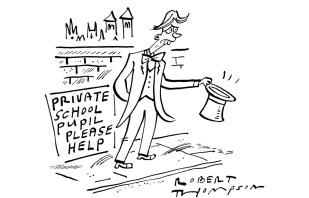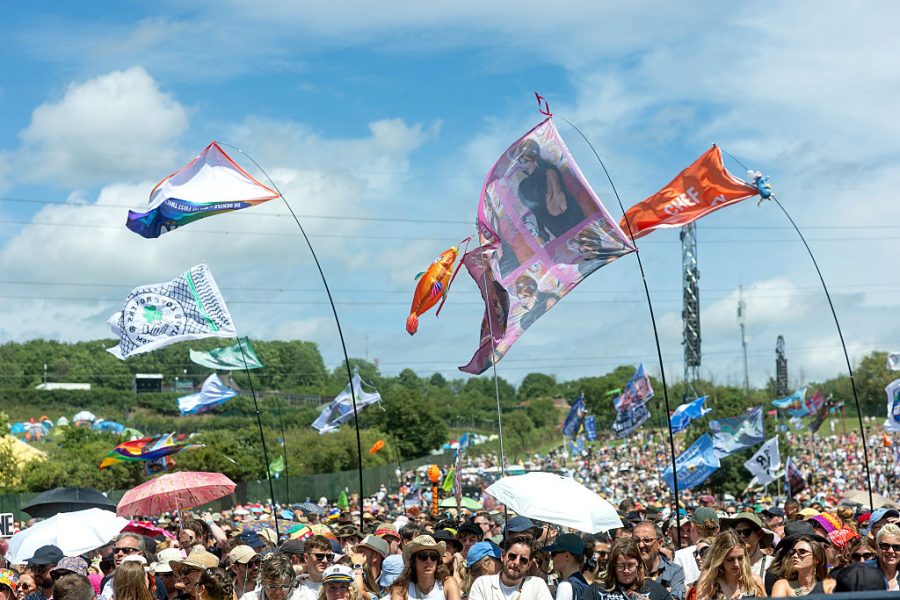Peter Parker has narrated this article for you to listen to.
In 1943 the music critic Desmond Shawe-Taylor placed an advertisement in Exchange & Mart offering a pair of trooper’s breeches for sale. A number of men replied, one asking ‘Have they been worn by a trooper or just yourself?’, while another observed: ‘It is always good to see the boys pulling themselves into tight troopers and then admire the “smashing finish”.’
Members of the Household Division of the British Army, in their figure-hugging breeches and scarlet coats, had always held a particular appeal for homosexual men. It was therefore fortunate that, though the military authorities publicly denied it, there was a long tradition in Guards regiments of combining ceremonial duties with casual prostitution.
In 1822 a scandal erupted when the Bishop of Clogher was apprehended having sex with a grenadier
It is for this reason that while I was researching Some Men in London, my two-volume anthology of queer life in the capital from 1945 to 1967, guardsmen kept popping up – in relationships with people such as Stephen Spender, John Lehmann and J.R. Ackerley, or providing more temporary services for others.
In his diaries of the 1940s and 1950s the civil servant George Lucas provides a startlingly detailed record of many evenings spent at Marble Arch seeking sex and solace among the guardsmen who congregated there. Such liaisons carried risks of course: Lucas was several times threatened and robbed, while the theatre critic James Agate, whose flat was hung with photographs by Angus McBean of soldiers who had somehow mislaid their uniforms, found himself being blackmailed by a guardsman he had bedded.
The historian James Pope-Hennessy also made such regular use of guardsmen that when he once slept with a woman, she heard him mumble sleepily from beneath the sheets the following morning: ‘Are you going to shave now, darling, or when you get back to the barracks?’
The significant role these mostly obliging soldiers have played in the history of British homosexuality goes back a long way. In July 1822, for example, a major scandal erupted when the Bishop of Clogher was apprehended in the back room of the White Lion public house off the Haymarket having sex with a grenadier.
During the Victorian period, a gentleman who fancied ‘a bit of scarlet’ had only to take a stroll in those parts of London where the Guards had their barracks. John Addington Symonds recalled being approached one evening in 1865 by a guardsman lurking in a passage near St George’s Barracks in Orange Street. The soldier said he knew a house nearby where they could go, but Symonds was too nervous to take him up on this offer.
Twelve years later Symonds was a good deal less shy and took time off from giving lectures at the Royal Institute on ‘Florence and the Medici’ to spend the afternoon with a ‘brawny young soldier’ at Mrs Truman’s establishment in Albany Street. This house of assignation, masquerading as a tobacconist’s, was conveniently situated next door to the Regent’s Park Barracks, then home to the Royal Horse Guards. ‘There are lots of houses in London where only soldiers are received, and where gentlemen can sleep with them,’ says a former Foot Guard in the anonymously authored 1881 novel The Sins of the Cities of the Plain, which, although a work of pornography, is generally agreed to provide an accurate account of London’s homosexual underworld at this period.
Symonds found that his guardsman looked upon ‘the affair that brought us together in that place from a business-like and reasonable point of view. For him at all events it involved nothing unusual, nothing shameful’. Similarly, the soldier in The Sins of the Cities of the Plain explains: ‘When a young fellow joins, someone of us breaks him in and teaches him the trick; but there’s very little need of that, for it seems to come naturally.’
Evidence of the continuation of such practices was provided in later criminal trials. In a widely publicised case of 1931, for instance, a 19-year-old Welsh Guardsman called Evans, who was accused of ‘demanding £15 with menaces’ from a man with whom he had regularly been having sex in Hyde Park, stated in court that he had been inducted in homosexual practices by his fellow guardsmen, who had also provided introductions to potential clients.
Concern about this case and the press coverage it had received led to a conference being hastily convened at which military leaders met the director of public prosecutions and senior figures in the Metropolitan Police. The GOC London District, who admitted to having discharged 50 guardsmen in the past year on suspicion of homosexual activity, said that he wanted to ‘develop a feeling in the regiment against this type of offence’, while the DPP suggested a course of lectures in which soldiers were warned about the kind of men who might approach them while they were off duty. Such measures were clearly ineffective.
Some 30 years later a guardsman interviewed by Simon Raven for his 1960 article in Encounter on ‘The Male Prostitute in London’ said that older soldiers were still advising the newcomer ‘which pubs or bars to frequent, or which street corners to wait on, and [would] sometimes offer to accompany him in order to see fair play’. In his memoir of Brian Desmond Hurst, Christopher Robbins recalls the film director announcing one day in the 1970s: ‘Exciting news. The corporal-major of the Household Cavalry telephoned to say that the colonel had just opened a box of new recruits.’
The judge in the Evans case said he was appalled that ‘members of the Guards, wearing his Majesty’s uniform, have degraded themselves in a Royal Park’. Hyde Park had in fact long been a notorious cruising area for gay men precisely because Knightsbridge Barracks, where the Household Cavalry was stationed, was on its southern edge.

In the mid-1940s the future MP Ian Harvey was living in Trevor Square, a three-minute walk from these barracks. ‘I noticed on my way home from dinner in the evenings that the troopers, who were in uniform, wandered up and down and then disappeared into the park,’ he recalled. ‘Under the darkness of the trees there was a veritable parade. I was intrigued.’ Harvey became a regular ‘twank’, as guardsmen called their clients, and found ‘a very convenient place near the Peter Pan statue in Kensington Gardens’ in which to have sex. This activity continued ‘on and off, for 13 years’, until he was eventually arrested in 1958 while having sex with a guardsman – not in Hyde Park but St James’s Park, where homosexual activity was also rife because of its proximity to the Wellington Barracks in Birdcage Walk, home to the Coldstream, Grenadier, Irish, Scots and Welsh Guards.
Guardsmen touting for business were also found propping up the bars of pubs in the vicinity of barracks. One of the most notorious was the Pakenham Arms in Knightsbridge, which in May 1950 was raided by the police. Thirty military personnel, ‘mostly Guardsmen’, were found on the premises, along with 60 civilians who were known to the police as ‘male perverts’. Thereafter the pub was ruled out of bounds by the military authorities, but there were plenty of other places of assignation, such as the Red Lion in Soho, the Welsh Harp in Covent Garden, the Bag O’Nails on Buckingham Palace Road and an all-night coffee stall at Victoria Station.
It was not until 2016 that the law which made homosexual acts grounds for dismissal from the Armed Forces was repealed, and rather than giving lectures on how to avoid ‘perverts’, the army now provides new recruits with diversity training. Better pay and conditions mean that guardsmen have less need to supplement the king’s shilling, but in 2018 it was reported that a member of the Household Cavalry who was often seen escorting the royal family had a parallel career in gay porn films. People affected to be deeply shocked, but it could be said that the soldier was simply adapting a time–honoured tradition for the modern age.







Comments